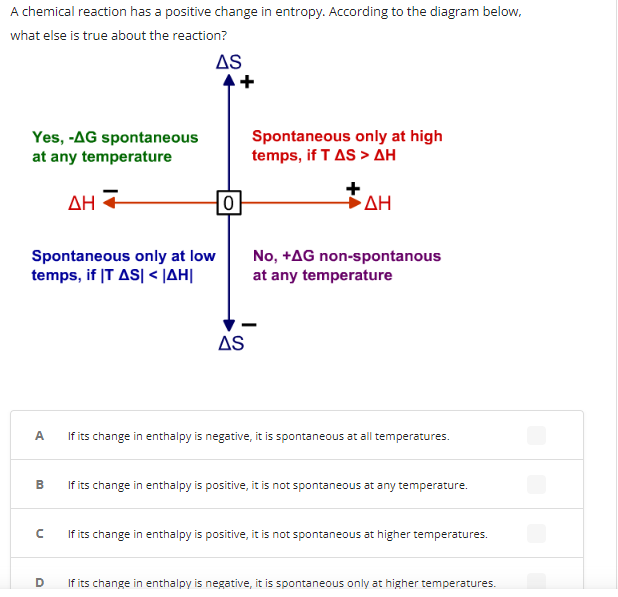chemical reaction has a positive change in entropy. According to the diagram below, that else is true about the reaction? AS Yes, -AG spontaneous at any temperature Spontaneous only at high temps, if T AS > AH AH 7 AH Spontaneous only at low temps, if |T AS| < AH| No, +AG non-spontanous at any temperature AS A If its change in enthalpy is negative, it is spontaneous at all temperatures. B If its change in enthalpy is positive, it is not spontaneous at any temperature. If its change in enthalpy is positive, it is not spontaneous at higher temperatures. D If its change in enthalpy is negative, it is spontaneous only at higher temperatures.
chemical reaction has a positive change in entropy. According to the diagram below, that else is true about the reaction? AS Yes, -AG spontaneous at any temperature Spontaneous only at high temps, if T AS > AH AH 7 AH Spontaneous only at low temps, if |T AS| < AH| No, +AG non-spontanous at any temperature AS A If its change in enthalpy is negative, it is spontaneous at all temperatures. B If its change in enthalpy is positive, it is not spontaneous at any temperature. If its change in enthalpy is positive, it is not spontaneous at higher temperatures. D If its change in enthalpy is negative, it is spontaneous only at higher temperatures.
Chapter17: Spontaneity, Entropy, And Free Energy
Section: Chapter Questions
Problem 4RQ: The free energy change, G, for a process at constant temperature and pressure is related to Suniv...
Related questions
Question

Transcribed Image Text:A chemical reaction has a positive change in entropy. According to the diagram below,
what else is true about the reaction?
AS
Yes, -AG spontaneous
at any temperature
Spontaneous only at high
temps, if T AS > AH
ΔΗ
AH
Spontaneous only at low
temps, if |T AS| < JAH|
No, +AG non-spontanous
at any temperature
AS
A
If its change in enthalpy is negative, it is spontaneous at all temperatures.
B
If its change in enthalpy is positive, it is not spontaneous at any temperature.
If its change in enthalpy is positive, it is not spontaneous at higher temperatures.
D
If its change in enthalpy is negative, it is spontaneous only at higher temperatures.
Expert Solution
This question has been solved!
Explore an expertly crafted, step-by-step solution for a thorough understanding of key concepts.
This is a popular solution!
Trending now
This is a popular solution!
Step by step
Solved in 2 steps with 2 images

Knowledge Booster
Learn more about
Need a deep-dive on the concept behind this application? Look no further. Learn more about this topic, chemistry and related others by exploring similar questions and additional content below.Recommended textbooks for you


Chemistry
Chemistry
ISBN:
9781305957404
Author:
Steven S. Zumdahl, Susan A. Zumdahl, Donald J. DeCoste
Publisher:
Cengage Learning

Chemistry: An Atoms First Approach
Chemistry
ISBN:
9781305079243
Author:
Steven S. Zumdahl, Susan A. Zumdahl
Publisher:
Cengage Learning


Chemistry
Chemistry
ISBN:
9781305957404
Author:
Steven S. Zumdahl, Susan A. Zumdahl, Donald J. DeCoste
Publisher:
Cengage Learning

Chemistry: An Atoms First Approach
Chemistry
ISBN:
9781305079243
Author:
Steven S. Zumdahl, Susan A. Zumdahl
Publisher:
Cengage Learning

Chemistry: The Molecular Science
Chemistry
ISBN:
9781285199047
Author:
John W. Moore, Conrad L. Stanitski
Publisher:
Cengage Learning

Chemistry: Principles and Practice
Chemistry
ISBN:
9780534420123
Author:
Daniel L. Reger, Scott R. Goode, David W. Ball, Edward Mercer
Publisher:
Cengage Learning

Chemistry by OpenStax (2015-05-04)
Chemistry
ISBN:
9781938168390
Author:
Klaus Theopold, Richard H Langley, Paul Flowers, William R. Robinson, Mark Blaser
Publisher:
OpenStax